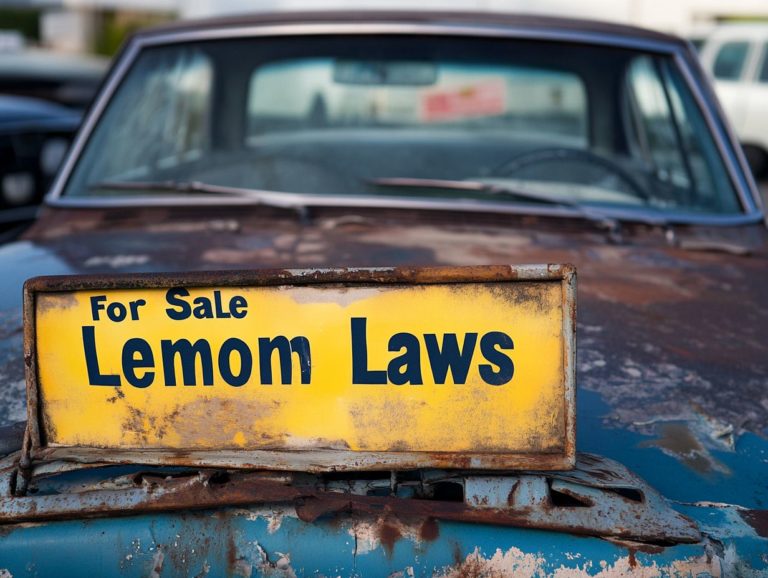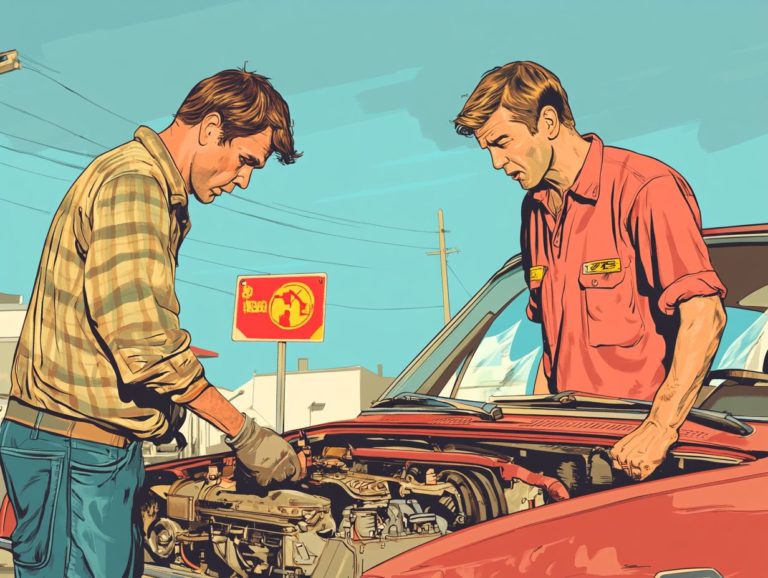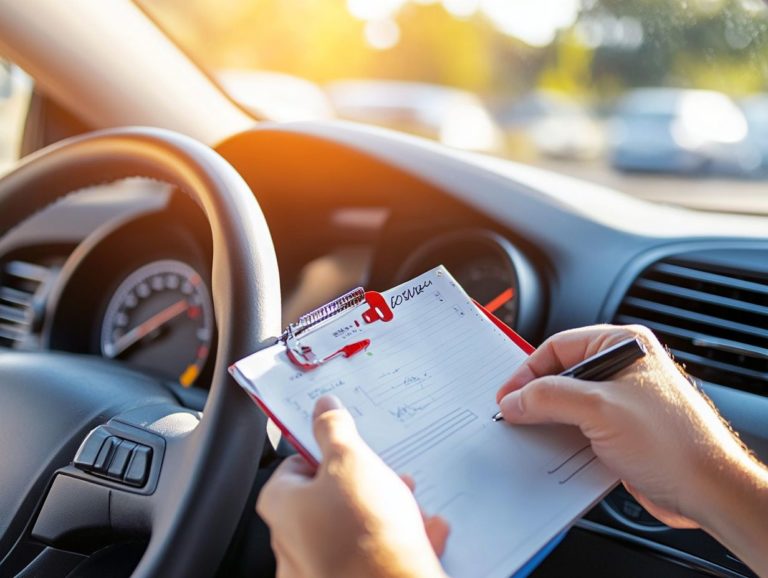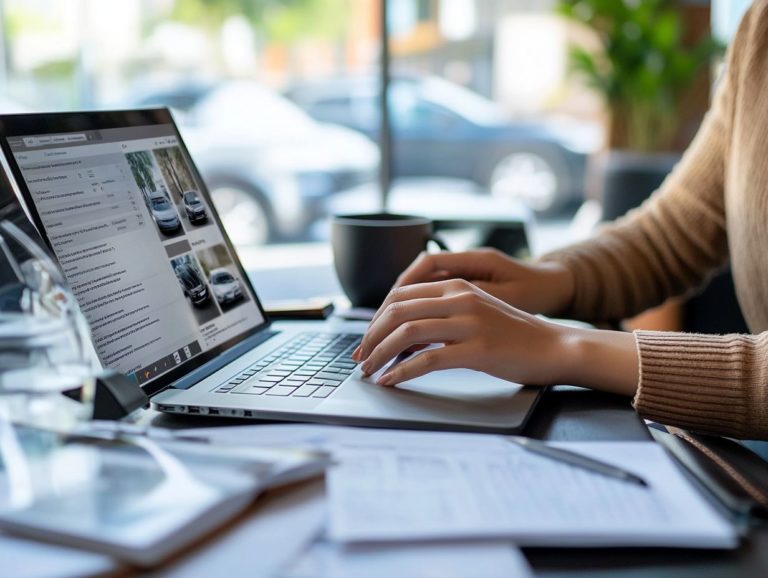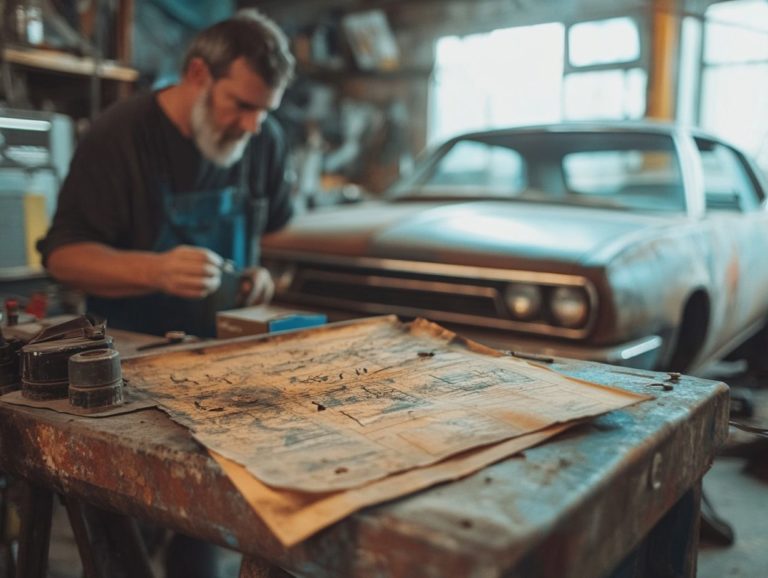How to Get a Good Trade-In Value for Your Car
Getting a solid trade-in value for your car can significantly impact your journey toward upgrading to a new vehicle. Dive in now to maximize your car’s worth and seize the opportunity for your upgrade!
This guide walks you through the entire process, starting with preparing your car for trade-in. From giving it a thorough cleaning and tackling those minor repairs to gathering all the essential documents, you ll be well-equipped.
You ll uncover strategies to research your car’s value, negotiate effectively with dealerships, and explore alternative selling options. Learn how to seal the deal and get the best value for your car!
Contents
Key Takeaways:

Clean and fix minor issues before trading in to increase the value of your car.
Research the value of your car and understand the factors that can affect its trade-in value.
Negotiate effectively with dealerships by being prepared and knowing your car’s worth.
Preparing Your Car for Trade-In
Preparing your car for trade-in is a pivotal step that can greatly enhance its value. Whether you’re contemplating an upgrade to a newer model or simply wish to sell your vehicle, understanding how to negotiate trade-in values can help you secure the best price.
Consider factors such as how well your car runs, the overall look of your car from the outside, and thorough cleaning. These elements are essential in attracting dealers and improving your trade-in outcome.
Gather your vehicle history and research platforms like Kelley Blue Book and Edmunds. This is vital in ensuring you receive a fair offer. Don t overlook timing, as market fluctuations can significantly influence your car s value.
Cleaning and Fixing Minor Issues
Cleaning and addressing minor issues can significantly boost the overall look of your car, directly influencing its trade-in value.
By dedicating some time to interior detailing think vacuuming the carpets, wiping down surfaces, and cleaning the upholstery you can dramatically enhance the overall appearance of your vehicle.
Don t forget the exterior; a meticulous wash and wax can make your car gleam, capturing the attention of potential buyers and dealers alike. Tackling minor mechanical concerns, such as replacing burnt-out light bulbs or fixing small dents, might seem insignificant, but these simple tasks highlight a well-maintained vehicle.
Such improvements can serve as compelling points during trade-in negotiations, ultimately leading to a better deal for you.
Gathering Necessary Documents
Gathering the necessary documents is essential for ensuring a seamless trade-in process. It can significantly influence the value you receive.
As you prepare to visit the dealership, be sure to have the vehicle title in hand, as it serves as proof of ownership. Maintenance records are equally important, showcasing the car’s upkeep and repair history.
If there s a lien on the vehicle, securing a lien release is crucial to smooth out the transaction. Having these documents at your fingertips not only simplifies negotiations but also enhances your trade-in value; a well-documented vehicle commands credibility.
Leverage resources like Kelley Blue Book and Edmunds to provide you with an accurate valuation. This will bolster your position during discussions with dealers.
Researching the Value of Your Car
Researching the value of your car is crucial for understanding your trade-in options and negotiating effectively with dealerships. By utilizing trusted resources such as Kelley Blue Book and Edmunds, you can access accurate market assessments that will help you gather competitive quotes.
Remember, market fluctuations can significantly impact car values, so it s vital to stay informed and adjust your strategy as needed. This thorough research not only gives the power to you during negotiations but also ensures that you won t undersell your vehicle while seeking the best possible price.
Start preparing your car today for a rewarding trade-in experience!
Factors that Affect Trade-In Value

Many factors influence the trade-in value of your car. Dealerships consider mechanical issues, so fix any repairs beforehand.
The age and mileage of your vehicle matter too. Older cars or those with higher mileage typically earn lower offers.
The overall condition of your car inside and out affects offers significantly. A clean car with a detailed service history usually fetches a better price.
Market fluctuations, seasonal trends, and local demand can affect trade-in values. Be aware of these elements to prepare effectively and maximize your car s worth.
Negotiating with Dealerships
Negotiating with dealerships for your car’s trade-in can be daunting. With the right strategies, you can secure the best price possible.
Prepare yourself by understanding your car’s worth and gathering multiple quotes. This knowledge strengthens your position.
Use effective tactics, like separating transactions, to clearly see the value of your trade-in compared to your new car purchase. This clarity can significantly impact the deal.
Knowing when to walk away gives you the power during negotiations. Establish a firm standard for what you’re willing to accept.
Don t miss out on potential offers be ready to seize the moment when the right deal comes along!
Effective Tactics for Getting a Higher Value
Employing smart tactics can enhance your negotiation for a higher trade-in value, particularly when you understand new car trade-in values. This ensures you secure the best possible price for your vehicle.
A thorough understanding of your vehicle s worth is essential. By conducting thorough research, you can gather insights into the latest market trends.
Timing is crucial. Approach dealers during peak sales periods to take advantage of their eagerness to close deals.
Armed with multiple quotes, you strengthen your position. Counter low offers confidently to get the price you deserve.
Being assertive in negotiations showcases your knowledge and fosters respect. This sets the stage for a more favorable outcome.
Considering Other Options for Selling Your Car
Exploring alternatives like a private sale or online platforms can unlock financial benefits beyond a trade-in. While a trade-in offers convenience, private sales can yield greater profits.
Selling privately lets you negotiate directly with buyers. However, consider factors like sales tax and the selling process when deciding how to part with your vehicle.
Evaluate all your options carefully. This positions you to make an informed decision that aligns with your financial goals.
Private Sale vs. Trade-In
Private sales often offer more profit potential than trade-ins, but they come with challenges. Selling your car privately can be rewarding, but it requires effort.
Understand your vehicle’s market value and develop marketing strategies to attract buyers. While selling directly can yield a higher financial return, it requires a time investment.
Conversely, trade-ins offer a straightforward, hassle-free experience. The dealer handles all the paperwork, but this convenience often results in a lower sale price.
Weigh your comfort with the selling process against your immediate financial needs. This ensures you choose the best method for your situation.
Online Selling Platforms

Online selling platforms have become an attractive option for you if you’re looking to sell your vehicle. They often offer better prices than traditional trade-ins.
You can reach a wider audience with these platforms. This allows you to showcase your vehicle to buyers from different areas.
Each online marketplace comes with unique features, including user-friendly interfaces, advanced filtering options, and secure payment methods, all designed to make your selling experience smoother.
When you decide to utilize these platforms, focus on capturing high-quality photographs and crafting detailed descriptions that highlight your vehicle’s key attributes.
Responding quickly to potential buyers helps create a positive experience. This boosts your chances of closing a sale at a competitive price.
Finalizing the Trade-In Deal
Finalizing the trade-in deal requires attention to several essential steps. This enables you to secure the best possible price for your vehicle while fully grasping the implications of the offer.
Understanding the Trade-In Process
Understanding the trade-in process is essential for you to negotiate effectively and secure the best price for your car. By familiarizing yourself with each step from the initial appraisal to finalizing the deal you can navigate this complex journey with confidence.
- Start with the appraisal: it s crucial to gather all relevant information about your vehicle, including service records and accident history.
- Being well-informed about your car s past boosts your credibility and enhances your negotiating power. This knowledge can significantly influence both your negotiations and the final offers you receive.
- Once you present your vehicle for appraisal and discuss its condition, the next steps involve evaluating the offers you receive and comparing them against market values to ensure you achieve a fair deal.
Ensuring a Fair Trade-In Value
Ensuring you receive a fair trade-in value requires diligent preparation and a proactive approach during trade-in negotiations.
To navigate this process effectively, it s crucial for you to understand the factors that influence what a dealership may offer. Utilizing resources like Kelley Blue Book and Edmunds provides you with valuable insights into your vehicle’s market value, helping you set realistic expectations based on accurate data.
Armed with this information, you can confidently approach the negotiation table. This not only allows you to articulate an informed position but also gives you the power to challenge any low offers that come your way. Staying informed about current market trends and vehicle demand will further enhance your negotiation efforts, ensuring that the final deal truly reflects your vehicle s worth.
Frequently Asked Questions
How can I improve my car’s trade-in value?

Want to boost your car’s trade-in value? Here are some effective tips! Keep it well-maintained, get any necessary repairs done, and present it in clean and good condition. You can also consider what to know about trade-in value by adding desirable features or upgrades, like a new sound system or alloy wheels.
Is it better to trade in my car or sell it privately?
It ultimately depends on your personal preference and circumstances. Trading in your car may be more convenient and time-saving, but you are likely to get a lower value compared to selling it privately. However, selling it privately also comes with the responsibility of advertising and negotiating the sale price.
How do I determine the value of my car for trade-in?
You can start by researching the market value of your car through online resources or consulting with a trusted mechanic or dealer. Take into consideration factors such as the car’s age, mileage, condition, and current demand. Be sure to also get multiple trade-in value offers from different dealerships for comparison.
Should I negotiate the trade-in value?
Yes! Always talk to the dealer about your car’s value. Know your car’s worth it can really help you get a better deal.
Can I still trade in my car if I owe money on it?
Yes, you can trade in your car even if you owe money. Check with your lender about any restrictions before proceeding. You can also negotiate with the dealership to cover the remaining loan amount in the trade-in deal.
Should I disclose issues with my car?
Yes, be honest about any known issues. Hiding problems can backfire and hurt your trade-in value. Be upfront about repairs you’ve made and provide documentation if you can.

